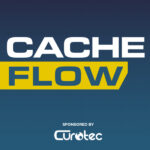Dive into the transformative world of corporate retreats with Jared Kleinert, Founder & CEO of Offsite. Exploring the evolution of workspaces, Jared shares his vision of bringing people together for impactful gatherings. Discover the blend of technology and hospitality shaping the future of remote and hybrid companies. It’s more than just a venue – it’s about connecting, solving, and inspiring. Join us for an insider look at reinventing offsite retreats!
Here are a few of the topics we’ll discuss on this episode of Cache Flow Podcast.
- Offsites are multi-day team-building experiences.
- Offsite offers end-to-end retreat planning.
- Insights into a dual service/software business model.
- Navigating the post-pandemic remote work evolution.
- The success of detail-oriented investor updates.
Resources:
Connect with Jared Kleinert:
Connect with our host, Brian Dainis:
Quotables:
- 09:03 – I feel bad for early WeWork employees. One of our team members was relatively early at WeWork. I have a couple friends that were like first 50 or so. I feel bad for them and sort of, you know, we don’t have to feel too bad for VCs, but like, you know, you feel bad for the people that invested in that and it didn’t go their way. That being said, I do think the commercial real estate space is going to crumble and that’s good for offsite because we would have even more business.
- 16:51 – And a lot of companies have started that way, like take what was a manual process and automated away should be the formula for a great company, but we gotta do things that don’t scale and see if it’s a viable company to start. I also am not a technical founder, so my first move was seeing if I could get companies to pay for someone or something else to plan their offsites
- 29:33 – If I look at the competitive landscape, if I look at the market size, it’s like we have as good of a shot as anyone to build the category, defining a company or get up there with the, you know, top two or three. It’s not gonna be easy to get there, but the path seems pretty clear. Like I’m doing annual planning right now, I’m like, okay, these metrics are kind of easy to define, they’re gonna be hard to hit, but you know, there’s pretty clear definition of what we need to do now. It’s just a matter of executing. But I think that’s a pretty privileged position to be in versus sort of having so many unknown unknowns and not knowing like what the north star is or who you’re building for or why it’s important. Like all these things are pretty clear for us. And you know, we have as good of a shot as anyone to win, which is all, all you can ask for.
- 41:30 – I think everyone skips that part. Like go interview your top paying clients, go, you know, do research to the point where it seems stupid and repetitive, but like you should get to the point where you can build an entire profile where you know every nuanced thing about your ideal client profile. Like the phrases they would use to describe your product or service, where they go to get their information online, what communities they’re a part of, like go do very deep customer development work, step one, step two, run quick and cheap marketing experiments like a week long and you know, a hundred dollars or like if you’re a Fortune 1000, it might be a month long and a $10,000 budget, but that relative to like scaling it, that’s very small but quick and cheap experiments.
- 56:29 – On average the ones that are doing monthly updates are growing faster, are more successful than the ones that do quarterly or, or no updates at all. I think it’s mostly, it’s like an exercise in self-reflection on behalf of the founders and making sure that they’re thinking about the business programmatically and, and systemically. It’s also the communication with investors. People can offer support, bail them out, like when you need help.





